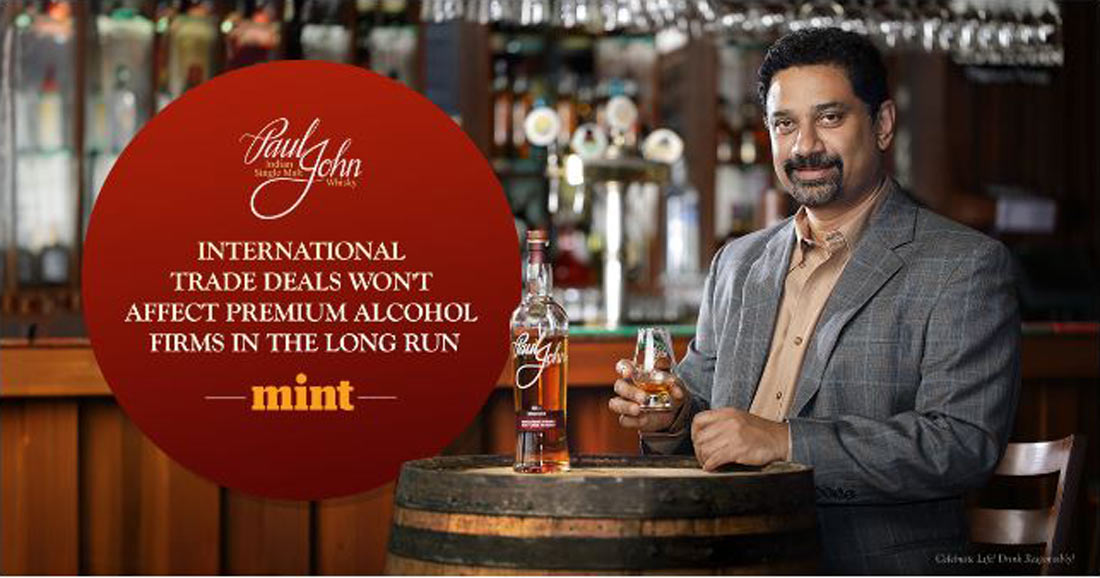Published by Varuni Khosla, on Dec 8, 2023
Trade deals won't hit quality alcohol firms in the long run
Delhi: Leading Indian alcoholic beverage manufacturers will remain unaffected by the recent trade agreements between India and Australia, or with other countries, said Paul P. John, chairperson of John Distilleries Pvt. Ltd, backed by Sazerac Co.

While the entry of new spirits under the trade agreements may have a short-term impact, it is not likely to have any significant effect on those operating in the premium and finer spirits business.
“It will take some time for the agreements to come in, as the talks are going on. But as long as we have a level playing field, temporarily we might witness a small dip in sales for some India players, but it should not be a problem so long as brand registration fee across different states is similar for international brands. Indian companies have to be prepared for tariffs to come down, and we will have to be competitive in terms of quality," John said in an interview with Mint.
According to a report by the Confederation of Indian Alcoholic Beverage Companies (CIABC), the FTAs, particularly with the UK, will impact premium whisky companies in India. It said annual scotch whisky volumes has grown 40% in India from the previous year to eight million cases during January-June 2023.
The impact on the Indian premium whisky segment will be determined by the extent of concessions granted under the FTAs.
John Distilleries, with a turnover of ₹7,000 crore, expects a 15% growth over a year ago, primarily supported by its whisky portfolio.
According to industry estimates, the company produces about 20 million cases per annum across brands and will close the year with a sale of around 24 million cases. A majority of the company's sales volumes originate from the southern states. Currently, John Distilleries has no plans to go public, he added.
Apart from its acclaimed premium collection of single malts, the primary focus is on mass-market whisky, Original Choice, mainly sold across Karnataka, Tamil Nadu, Kerala, and Andhra Pradesh. Northern regions such as Chandigarh and Haryana also contribute significantly to its business. Additionally, the company produces premium brandy, including Mont Castle and Roulette, along with Paul John XO. Besides, John Distilleries recently introduced a new variant of gin.
According to John, there is substantial potential for selling brandy, particularly in south Indian markets.
Mint had earlier reported that American family-owned spirits manufacturer Sazerac owns 43% in John Distilleries.
John said some states have significantly higher taxes, while others impose exorbitant label registration fees for Indian brands. For instance, in a market such as Delhi, an Indian brand is required to pay ₹25 lakh to register its label, while it is only ₹2 lakh for an international brand, he added.
Established in 1992 as a partnership firm, the company underwent re-registration in 1996, adopting a new name as a private limited company.
Currently, it operates in around 50 countries, including India, primarily exporting its single malts. International markets account for about 50% of its single malt sales. According to CIABC, the high-price segments are witnessing faster growth compared to low-price ones. The share of Indian products in this category has risen from 18% last year to 20% this year, indicating bright growth prospects for Indian firms compared to imported liquors.
The association estimated that the total sales of Indian-made foreign liquor products in 2022-23 stood at 385 million cases of nine litres each. This marks a 14% increase from the previous year, and is nearly 12% higher than pre-covid levels (2019-20), indicating a complete recovery from the impact of the pandemic.
To read original news, Click Here.

